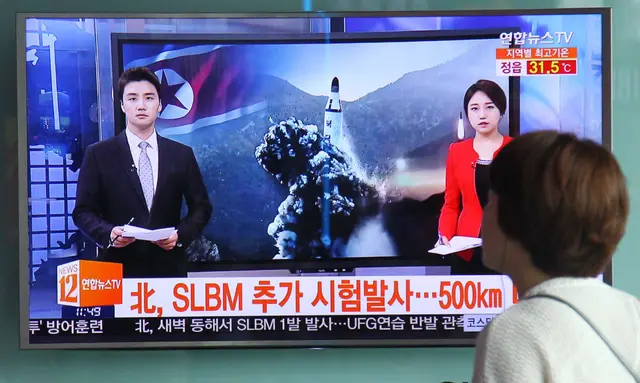The Democratic People's Republic of Korea (DPRK) appeared to have conducted its fifth nuclear test after an artificial earthquake was detected at a site where its fourth nuclear test was carried out earlier this year, Yonhap news agency reported on Friday.
South Korea's military believed the Democratic People's Republic of Korea (DPRK) may have conducted the "most powerful" nuclear test so far on Friday after an artificial earthquake was detected at a site where its fourth nuclear test was carried out earlier this year.
A South Korean Defense Ministry official was quoted by Yonhap news agency as saying that it was a nuclear test according to a preliminary analysis, but the military is analyzing details on what type of nuclear material was used and whether it was successful.
People watch a TV broadcasting a suspected nuclear test held by Democratic People's Republic of Korea, at a train station in Seoul, South Korea, Sept. 9, 2016. Photo: Xinhua/Yao Qilin
South Korea's Joint Chiefs of Staff (JCS) was quoted as saying that artificial earthquake waves of magnitude 5.0 were detected at about 9:30 a.m. local time (0030 GMT) at the DPRK's main Punggye-ri nuclear test site. The JCS is analyzing the details.
South Korea's National Assembly said Friday it will convene an emergency meeting of lawmakers amid the rising speculations that DPRK conducted another nuclear test, despite strong warnings by the international community.
South Korean President Park Geun Hye said on Friday that DPRK had conducted a nuclear test in clear violation of United Nations Security Council resolutions and in a direct challenge to the international community, according to Reuters.
The DPRK's fifth nuclear test proved the country's leader Kim Jong Un's "maniacal recklessness" in completely ignoring the world's call to abandon his pursuit of nuclear weapons, Ms Park was quoted as saying by her office.
Pyongyang has conducted a series of ballistic missile launches since top DPRK leader Kim Jong Un gave an order on March 15 to test a nuclear warhead and ballistic rockets capable of carrying the warhead "in a short time."
China initiates contingency plan
China's Ministry of Environmental Protection (MEP) on Friday activated a contingency plan following a suspected nuclear test by the Democratic People's Republic of Korea (DPRK).
The MEP initiated a Class-II emergency response at 8:35 a.m. after a magnitude-5.0 earthquake was detected in the DPRK at 8:30 a.m., which is suspected to be the DPRK's fifth nuclear test.
Radiation monitoring stations in China's three northeastern provinces and eastern Shandong Province are operating normally.
The MEP has started radiation monitoring at the country's northeastern border.
Stocks sharply down
South Korean stocks traded sharply lower late Friday morning, as investors were spooked by the possibility of North Korea conducting a nuclear test and overnight losses on Wall Street. The Korean won fell sharply against the U.S. dollar.
The benchmark Korea Composite Stock Price Index (KOSPI) dropped 25.77 points, or 1.25 percent, to 2,036.96 as of 11:20 a.m. according to the Yonhap news agency.
Adding to woes, DPRK appeared to have conducted its fifth nuclear test earlier in the day as a massive earthquake was detected near its nuclear site in its northeastern region.
"Overnight falls in the U.S. stock market, coupled with DPRK's potential nuclear test, sapped investor sentiment here," said Lee Sang-hwa, an analyst at Hyundai Securities. "Also, Samsung Electronics' slump is weighing down the overall market sentiment."
Analysts said the DPRK's possible nuke test may have a limited impact on the local stock market as was proven in the past but roil the market for a short period of time.
(APD)
 简体中文
简体中文










